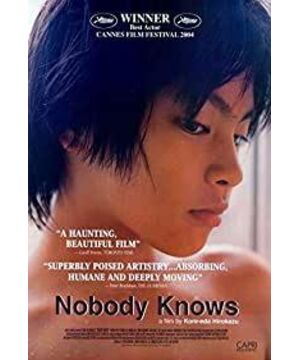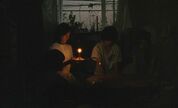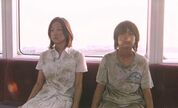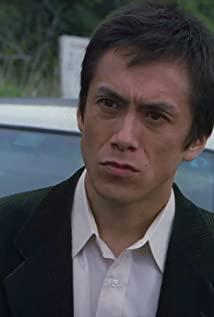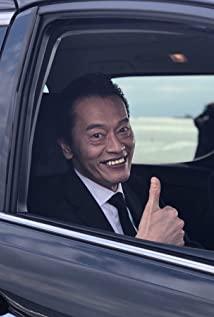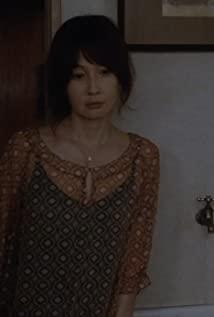If you watch such a movie, you can still be indifferent and calm, then you can only say how cold and empty your heart is like? !
What does it feel like to watch a movie with tears streaming down your face? Have you ever had such an experience? Do you remember the episode where you cried for it?
When the tears fall, are you afraid that the people around you will see it?
This may not seem uncommon to the audience with low tears. Once, watching "Xueling Bear Wind" with his son, this bear boy rarely cried, but when he saw the climax - when Xiong Da accidentally fell into the ice lake and was about to be drowned by the ice water, he couldn't help it. I started crying, making me sleepless, who was drowsy, so I quickly tried to soothe his emotions.
In my impression, the famous show host Dou Wentao is also a low tear audience. A few years ago, I followed "The Three Walks of Qiang Qiang". Every time he talked about a topic related to the movie, Dou Wentao always said casually that he was easily moved to tears in any movie he watched: Director Xu Haofeng came, Dou Wentao said it once; Lu Chuan The director came, Dou Wentao said it again; Director Jia Zhangke came, Dou Wentao said it again.
He said this over and over again, which made me have an illusion: as if watching a movie, if you don't cry when you watch it, there is either a problem with the movie or a problem with your lacrimal glands.
01
This is the sixth Hirokazu movie I've seen. "Nobody Knows" is the most tragic of the six. In the past, when I recommended Hirokazu-eda to my friends, I never mentioned this movie, because I was too worried that recommending such a movie to my friends would make them fall into inexplicable grief.
But since the theme of the movie discussed this time is "watching a movie with tears in my eyes", then I have to move out of this movie that once made me cry like a child.
The story of "Nobody Knows" is simple.
Mother Keiko Fukushima has four children: Ming is twelve, Kyoko is eleven, Shigeru is seven, and Xue is five. Among the four children, except for the elder brother Ming, the three younger siblings are all "black children"; they are half fathers, and their fathers are different, but no one knows who is whose father.
Keiko works in a department store, none of her four children go to school, and Ming, who is a little older, takes care of three younger siblings. Due to their status as "black children" of their younger siblings, they usually do not dare to go out or take to the streets. They can only occasionally run to the balcony, put their toes on their toes, and take a look at the outside world.
One day Keiko left without saying goodbye, leaving behind 200,000 yen and a note. In this way, the mother entrusted the three younger siblings to the elder brother Ming. Since then, Ming has become the "parent" of this special family, responsible for his shopping, cooking, cleaning, cleaning, bookkeeping, looking for money, and so on, things that should be borne by adults.
In the middle, the mother Keiko came back once, took some clothes and left, and never came back. The elder brother Ming took care of his younger siblings day after day, fearfully.
When the money was running out, he went out alone to borrow money from a man his mother met before, but was disappointed; when he went to the supermarket to buy daily necessities, he was suspected of stealing, and was insulted and accused by the clerk; he could not find a playmate At the time, he could only go to the nearby school, looking at the peers who were practicing baseball on the campus across the fence with admiration; or practice swinging alone in the shade of the park.
From winter to summer, the days go on like this day by day.
Unable to pay the electricity bill, the apartment was out of power. All summer, the four children could only endure the scorching heat; unable to pay the water bill, they had to go to the park on the street to pick up the running water, take a bath, wash the clothes, and refill them in beverage bottles. The money on hand is getting less and less, so I can only go to the kind cashiers in the supermarket to ask them to provide some food for my younger brothers and sisters to survive.
If your clothes are broken, you will wear broken clothes; if your shoes are broken, you will wear broken shoes; if your headgear is long and messy, you will wear long and messy hair; If you lack food, you will live a life of lack of food and clothing.
Tragedy came silently. Five-year-old Xue fell from a chair on the balcony, fell ill, had a fever, and then went to another world.
With the help of his friend Saki Mizuguchi, the elder brother, Ming, packed the body of snow in the suitcase. On a midsummer night, he took the tram to the airport far away from home, and buried her in a place where the plane could be seen flying. on the pasture. Because my sister Xue's biggest wish before her death was to go to the airport one day to take a look at the plane passing overhead.
A movie that cried from beginning to end. After watching it, I felt very warm and strong, and I especially wanted to clench my fist and wave it in the air for a while.
02
Although the director is Hirokazu Kore-eda trying to keep a distance from the process of death and grief, we are still inevitably struck by death and grief.
Four children, one twelve years old, one eleven years old, one seven years old, and one five years old, have lived for nearly a year without any adult, in the days of lack of clothing, food, electricity and water, without any sensationalism. There are not too many painful engravings in the shots. It can be said that the director is very restrained, very forbearing, and very naturalistic, showing the original appearance of life and the original cruelty of life one by one, like hiding a knife in a scabbard. The knife inside was pulled out, and the cold light swayed and swayed in front of us.
Those four angel-like children, in the indifferent metropolis, in the bustling and bustling market, eating instant noodles, bathing in cold water, silently under the pressure of life, silently suppressing the fear of death, in the absence of He grew up quietly in an environment with no parents, no relatives, no reason, and no one knew.
At the last moment of the film, from darkness to dawn, brother Ming and Saki sat on the tram without saying a word. When the tram passed by the river, the river was calm.
At this moment, can your heart lake really be as still as stagnant water like the picture under the director's lens?
I don't know if there are audiences who don't cry.
Anyway, I let myself cry like rain, tears streaming down my face.
I watched a movie before, and when I saw emotions rushing and I couldn’t help crying, I would try my best to restrain myself and pull myself away from the plot of the movie. Even if I was really sad and sad, I would try very hard. Press back. But this time was different. I gave up pulling away and repressing, and instead let myself shed tears and let my tears fall like rain.
The French writer Flaubert once said that tears are as indispensable to the soul as water is to fish. Perhaps a movie like "Nobody Knows" is to let us open the window of our hearts, let the tears fall, and let the tears flow like a tide.
If you watch such a movie, you can still be indifferent and calm, then you can only say how cold and empty your heart is like? !
03
Generally speaking, we often use the life of the characters in the movie as a reference to measure our life.
If you are a mother, you have loved your children with all kinds of tenderness and affection, those four children, four like angels, will make you look at them, and they will overlap with your own children. You will project the way they are suffering and suffering on your children, and thus, you will project your tenderness and affection on them, and you will naturally cry for them.
If you are a father, you are busy with work, socializing, meetings, business trips, reporting, and business trivialities all day long, but you are indifferent to and ignorant of your child’s every move, frown, and smile. , when you see how these children fend for themselves without their father's care, you are naturally moved by them.
What about myself? It's hard for me to imagine how my children would survive in such an environment. I also can't believe my own child would fall into this situation. I can't even imagine that my children will grow up savagely like Ming, Jingzi, and Shigeru, and adapt to this world savagely?
But my father was as savage as Ming was to adapt to the world.
When my father was thirteen or fourteen, he lost his grandfather. Later, the grandmother remarried, and the father lived with his great-grandfather, who was in his sixties. In the collectivized era when work points were earned by manual labor, my father began to support himself as a teenager in order to support his family.
When I grew up and became sensible, I often heard from people in the village that when my father was very young, he began to learn how to plant rice, harvest and farm the land; when he was very young, he began to pick coal, pick coal, and dig coal in the coal mine; When my father was very young, like an adult, he went out to chop down trees, dig reservoirs, and pick hard salt. Unbelievable!
It's unimaginable! So small, it has to carry so much and so much weight. I only came out to work after graduating from college at the age of twenty-three or four, and my father has been working hard for ten years in this age!
My father was a taciturn man, and he never mentioned in front of us the days of suffering and suffering. Maybe my father felt that it was his life, and there seemed to be nothing to complain about.
Thinking of "Nobody Knows", and thinking of my father again, tears welled up from the bottom of my heart again.
04
There was another similar experience, which was particularly impressive.
It was a boy named Theo who moved me that time.
He is the protagonist of Donna Tate's novel "The Goldfinch".
When Theo was thirteen years old, his divorced mother took him to the Metropolitan Museum of Art in New York to see an exhibition. Unexpectedly, an explosion occurred in the museum and took his mother's life.
Theo, who has no relatives and no reason and whose father does not know where to go, had to temporarily stay in the house of a wealthy classmate. As a result, he endured all kinds of discomfort and unhappiness in that family.
When he was about to get used to everything in his classmate's house, his gambling-addicted father appeared in order to take possession of his mother's inheritance and forcibly took Theo away from his classmate's house and took him to a remote desert town.
In that remote desert town, Theo's father used to leave him in his apartment, leaving him to fend for himself. With no friends, no relatives, and sometimes even food, Theo might not even have the courage to live if he hadn't met Boris, a Russian boy in a situation very similar to his.
In order to survive, Theo and Boris learned to cook, and they also learned to get drunk; they learned to play truant, and they learned to take drugs; they learned to cheat money, and they also learned to cheat girls. As they fall, they strive to grow; as they decay, they strive to live.
The novel was very thick, with more than 600 pages in the Chinese version. Unlike the movie "Nobody Knows," which only told a story that happened within a year, it told the story of Theo's life.
Later, Theo returned to New York, where he found veteran craftsmen who had taken him in, taught him to identify antiques, and restored them. Later, Theo learned everything the old craftsman had taught him. He started working in antique shops, wandering around celebrity studios, and getting ready to marry his former classmate's sister; and later, Theo discovered the A New York girl loves something else and discovers Boris, a former life and death friend, who has become an international drug lord.
Two years later, I recall this novel with only these rough impressions. But there's a piece of it that I don't think I'll ever forget for the rest of my life.
It was a small plot that took place in about a third of the novel. Theo's father died in a drunk driving accident, and he had to return to New York from a desert town where he had no family.
Returning to Theo in New York, wandering aimlessly, he doesn't know where he should go, or who else in this world remembers him, knows him, and can take him in.
In the vast crowd, Theo accidentally found the father who had been staying at his classmate's house. He quickly raised his legs and ran over to say hello to him, but found that the classmate's father did not recognize him at all. he comes.
It wasn't until late at night that Theo decided to go back to the shop where the old man was restoring the antiques. When he stood under the dim street light and knocked on the old man's shop door, when the kind old man who was as kind as his grandfather opened the door, recognized him at the first time, and called Theo's name, I I couldn't hold it any longer, and tears flowed out.
At that time, it was late at night, and the family was already asleep. I sat dazedly on the sofa in the living room by myself, letting the tears keep pouring out.
How rare tears are for some! Facing the real, hard, bitter sadness in real life, the cold, empty and numb modern people, their eyes are as dry as marbles!
But when they are hit by sad moments in movies and novels, their hearts are opened, and their emotions are rushing, no matter how hard they try, it won't help, and they can't stop the tears from falling!
Israeli writer Amos Oz said that when people read a novel, 50% of the novel belongs to the writer, and 50% belongs to the reader himself. The reader of the novel is equivalent to the co-author of the writer.
Watching a good movie, a good movie that feels the same, like a movie like Hirokazu Koreeda and "Nobody Knows", isn't that the case?
—————————————————————END—————————————————————
[WeChat Public Account: Tang Shunleng Literature and Art]
View more about Nobody Knows reviews


